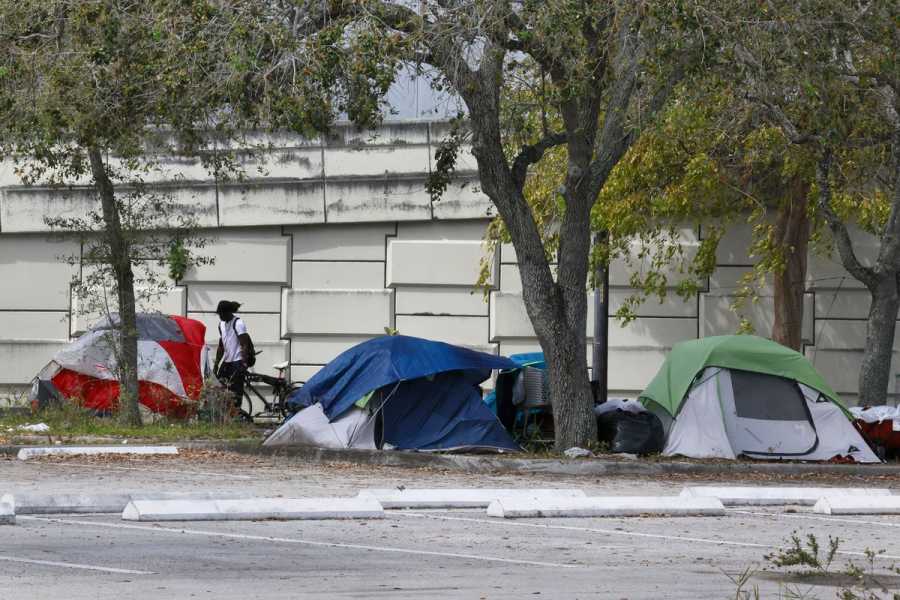This week, the justices will hear the biggest case on homelessness in decades.

A small tent encampment off of Broward Boulevard in Fort Lauderdale, Florida. Mike Stocker/South Florida Sun Sentinel/Tribune News Service via Getty Images Rachel M. Cohen is a senior reporter for Vox covering social policy. She focuses on housing, schools, homelessness, child care, and abortion rights, and has been reporting on these issues for more than a decade.
On Monday, the Supreme Court will hear oral arguments for the most consequential case in decades concerning the rights of people experiencing homelessness.
In Grants Pass v. Johnson, the Supreme Court will decide whether it constitutes cruel and unusual punishment to fine, ticket, or jail someone for sleeping outside on public property if they have nowhere else to go. A ruling in favor of the plaintiffs would make it easier for communities to clear out homeless people’s tent encampments, even if no available housing or shelter exists.
Over 650,000 people in America experience homelessness on any given night, and roughly 40 percent of those individuals are sleeping outside on the streets, in cars, parks, train stations, and other settings not designed primarily for human residence. Federal data published in late 2023 shows a rise in homelessness in most states.
In two major decisions over the last six years, the Ninth Circuit Court of Appeals held that criminalizing homelessness when a city lacks adequate shelter or housing violates the Eighth Amendment of the US Constitution. But amid a worsening homelessness crisis, government leaders have pressed the Supreme Court to reconsider, arguing those earlier rulings were incorrectly decided and left them unable to safely manage their communities.
“The Ninth Circuit and respondents have tried to downplay the ways in which the ruling ties local leaders’ hands, but their arguments only confirm the decision’s ambiguity and unworkability,” Democratic California Gov. Gavin Newsom wrote in an amicus brief filed in September.
Though leaders like Newsom say they have no desire to criminalize the homeless, that will be the most likely outcome in some places if the Supreme Court overturns Grants Pass. Some leaders in other cities have been more explicit that they hope to make their communities so inhospitable that homeless people will ultimately leave.
This was the case in Grants Pass, Oregon, too. In 2013, the Grants Pass City Council held a meeting to “identify solutions to current vagrancy problems,” where participants considered strategies for pushing homeless residents out. The city council president said Grants Pass’s goal was to “make it uncomfortable enough for them in our city so they will want to move on down the road.”
Grants Pass began aggressively enforcing penalties for sleeping outside on public property, like issuing $295 fines that increase to $537.60 if unpaid. Following two citations, the police could then find the homeless person guilty of criminal trespassing, which could lead to up to 30 days in jail and a new $1,250 penalty. The original lead plaintiff for Grants Pass v. Johnson had over $5,000 in penalties for living outside, before she died at age 62.
It’s not clear how the Supreme Court will rule, but what is clear is that many of the cities hoping to see Grants Pass overturned simply lack enough housing and shelter for the number of people currently homeless in their borders.
“The crux of the issue is we’re thinking about the focus on encampment closure without access to housing,” said Charley Willison, a Cornell professor who has studied the influence of police on cities’ homelessness policies. “The reality is if you ask people to move without there being somewhere to go, you’re not housing that individual and you’re in no way reducing or ending homelessness. And where will people go? They’ll go somewhere where police won’t find them that night and they’ll move again and again.”
Willison’s research found that 22 percent of mayors from over 120 cities station their homelessness staff within police departments. Even among those cities that station homeless outreach teams elsewhere, most still include formal roles for police. Seventy-six percent of homeless outreach teams formally involve the police, per another study she co-published last year.
While pressure for criminalization of homeless people would increase if the Supreme Court rules in favor of the Grants Pass plaintiffs, it is not inevitable that criminalization will occur. Jesse Rabinowitz, a spokesperson for the National Homelessness Law Center, pointed to states’ responses to the Supreme Court’s overturn of Roe v. Wade as an example of an alternative path.
“Just because states could inhibit abortion [after Roe’s overturn] didn’t mean they all did, and we saw many states pass constitutional amendments enshrining abortion protections,” he said. “The very same thing could happen for homelessness, though right now we’re laser-focused on April 22.”
Why more criminalization is likely if the Supreme Court rules against the defendants
The more interactions a homeless person has with the police, the more likely they are to be criminalized. Today most cities have policies that entangle homelessness outreach with policing, whereby police influence local homelessness policy or embed directly within homeless outreach teams.
Even if police engage in homeless outreach primarily to connect individuals to services or shelter, such outreach can also then involve citing people for violating camping bans or other offenses. “Whenever the police are involved, the possibility of punitive enforcement is introduced,” wrote Willison and her colleagues. “The risks of punitive enforcement are further compounded if this individual is, say, experiencing a behavioral health crisis.”
Concerns about criminalizing homeless people with mental and behavioral health needs came up in several amici briefs filed to the Supreme Court. More than one-fifth of people experiencing homelessness currently have a serious mental illness like bipolar disorder or schizophrenia, and the US Department of Justice has found that “the prevalence of unmet behavioral health needs” is a key driver in why “people who experience homelessness tend to have frequent (and often repeat) interactions with law enforcement.”
The American Psychiatric Association noted that police are also more likely to use excessive force when they interact with unhoused people with mental illness. Even when “well-intentioned law enforcement responders” respond to calls for help, according to the Substance Abuse and Mental Health Services Administration, the situations often escalate due to “the presence of police vehicles and armed officers that generate anxiety.”
Fining, ticketing, or arresting unhoused people — which local governments will be more easily able to do if Grants Pass is overturned — will make it harder for homeless people, who already cannot afford shelter, to obtain permanent housing later on.
Having a criminal record can make it more difficult to land a job, stable housing, and receive government benefits. Even among those who do find jobs, employees with records generally face significant earning penalties.
Owing fines can exacerbate an unhoused person’s already precarious financial situation and prolong their homelessness. One study of people experiencing homelessness in Seattle found those with outstanding legal debt spent roughly two more years without stable housing than those without such debt.
“Fining the insolvent is a cynical exercise,” wrote the Lawyers’ Committee for Civil Rights Under Law in its Supreme Court brief. “Outstanding debt impairs households’ ability to pay security deposits to move into permanent housing and can show up in credit screening reports that landlords use to deny admission to housing.” One federal study found roughly one in five landlords who place conditions on accepting rental aid impose credit score requirements.
Experts say there are other “collateral consequences” that can come from punishing people for violating anti-sleeping ordinances, including stripping people of their right to vote, their right to renew their driver’s license, and their probation.
Some advocates predict that the overturn of Grants Pass with no real housing alternative could lead to the erection of mass internment camps “akin to refugee camps that currently exist in other countries,” as one group warned in its Supreme Court brief.
There are city governments that have already been considering creating so-called sanctioned encampment sites, where people would be allowed to pitch tents but would be banned from doing so anywhere else. It has been an outstanding question if such campsites would even be legal under the Constitution, but a ruling from the Supreme Court could clarify that.
What could be done to help
If the Supreme Court overturns Grants Pass (and the earlier decision it was predicated on — Martin v. Boise), there will likely be more pressure on leaders to enact punishment on people sleeping in tent encampments, but that doesn’t mean such punishments will invariably occur.
States and communities could instead invest in building more housing and shelter — including “tiny homes,” interim housing options that can be built more quickly and easily than traditional facilities. Some research has indicated that it can be more costly to enforce anti-homeless laws than to find people housing, and it’s possible basic budgetary concerns could steer governments in a less punitive direction.

A tiny homes village in San Francisco. Gabriela Hasbun for Vox
“Using this very reactive and criminalizing approach for homelessness may actually be more expensive than engaging in long-term preventative planning,” Katherine Levine Einstein, a political science professor at Boston University, told Vox.
Another restraint on local government could come from members of the public. Individuals could decide to push back and speak out against policies they find cruel or ineffective and help lobby for more humane alternatives. Vox has previously reported on additional measures individuals can take to help their unhoused neighbors.
To help homeless individuals, leaders will need not only to address the housing supply crisis but also increase supports like rental assistance to keep more people from falling into homelessness. Many mayors feel they lack the funding to really move the needle on the homelessness crisis, and many of the entities that receive federal funding to provide homelessness support lack jurisdiction to actually help craft local policy.
Some cities have been thinking about soliciting community feedback in ways that drive more humane outcomes for homeless individuals. For example, in contrast to the citizen “complaint portals” many cities have established, which often incentivize more policing-centric strategies, some cities, like Los Angeles, are experimenting instead with “help portals” to invite public feedback more rooted in the well-being of the person experiencing homelessness.
To ensure communities can help homeless individuals, governments and nonprofits will need to invest in better research on the experiences of unsheltered people and push for more transparency on policing practices.
The current lack of good research makes it harder to design good policy or even to protest bad policy. “What happens to people who are unsheltered when their local government passes a camping ban?” Levine Einstein asked. “We don’t have that kind of data systematically.”
Sourse: vox.com